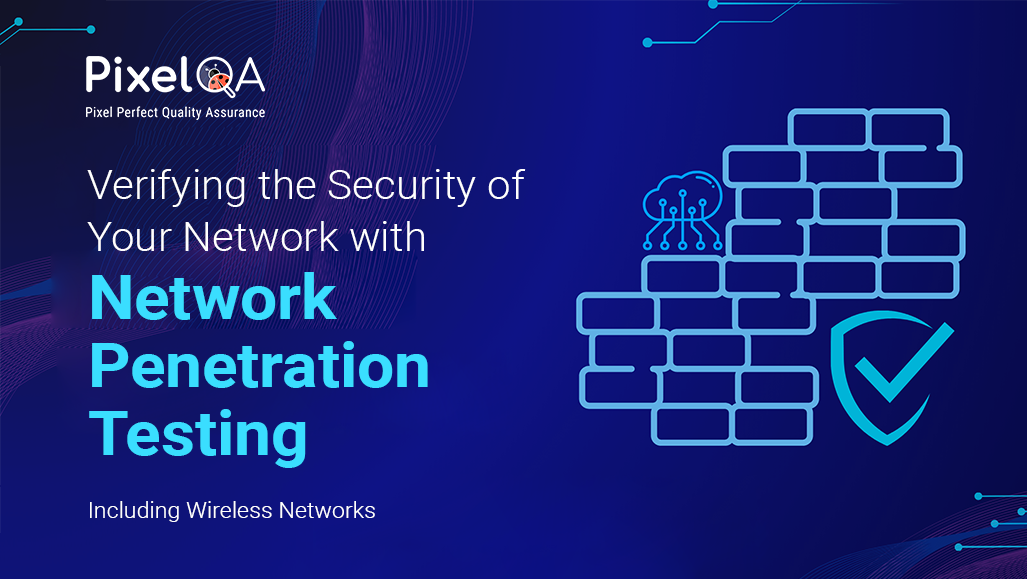
Table of Contents
- Introduction
- Define The Network Penetration Testing
- Why is it important to execute network penetration tests?
- Network Penetration Testing for Wired Networks
- Network Penetration Testing for Wireless Networks
- Benefits of Network Penetration Testing for Businesses
- Conclusion
Introduction
Evidence suggests that, given today's interconnections, cybersecurity is arguably one of the most pressing issues confronting humanity. Systems, with networking technology included among them, have become indispensable to businesses and organizations for conducting daily operations, collaborating with clients, and protecting sensitive data. This has never been truer than it is now, especially given the growing complexity of threats in the cyberspace industry. Penetration Testing Services are among the most effective ways for a business to safeguard itself against potential vulnerabilities in this evolving landscape.
Penetration testing, often referred to as ethical hacking, simulates a cyberattack on an organization to identify weaknesses that malicious actors could exploit. This analysis covers both digital systems, including overlooked or obscure vulnerabilities, and physical infrastructure. In this article, we’ll explore the importance of regular penetration testing and why it should be a cornerstone of every company’s cybersecurity strategy.
Define The Network Penetration Testing
Penetration testing involves an approved attempt to breach a network's defenses, including its hardware, software, and related devices, to identify potential vulnerabilities. Finding opportunities to strengthen the organization's security while avoiding harm is the goal.
These tests can be carried out in a variety of ways, including outside security penetration testing, in which the investigator attempts to exploit flaws from the outside, and inside penetration testing, in which the analyst attempts to join the organization from the inside.
Security Penetration testers will use a range of techniques, including sniffing, counting sifting, exploiting vulnerable frameworks, and breaking passwords. The product is a comprehensive analysis that identifies flaws and makes recommendations for mitigating the risks.
_638773788133098869.png)
Why is it important to execute network penetration tests?
1. Proactive Approach to Security
On proactive measures against security lies one of the strongest defenses against pentesting. Identifying and resolving vulnerabilities with forethought will allow businesses to avert data breaches, associated costs, massive financial losses, and damage to their business reputation.
2. Detect Weaknesses and Misconfigurations
Indeed, well-known security protocols can have imperfections such as inappropriate setups or out-of-date computer programs. Penetration testing makes a difference in recognizing these vulnerabilities, which programmers seem to utilize to gain unauthorized access to your framework.
3. Regulatory Compliance
Many companies, especially those handling sensitive data (such as funds or healthcare), are bound by strict laws that require frequent security assessments. A crucial part of putting these compliance measures together and keeping a safe distance from severe penalties is scheduling penetration testing regularly.
4. Test Incident Response Capabilities
By conducting a penetration test, organizations can evaluate their response to a potential security breach. Security organizations evaluate how well their protocols identify, stop, and mitigate cyberattacks.
5. Protect Sensitive Data
The majority of businesses keep crucial data, such as exchange insider information, client information, and intellectual property. By identifying various points of vulnerability in your organization and frameworks, penetration testing helps ensure that this sensitive data stays safe.
Network Penetration Testing for Wired Networks
In most business settings, wired systems are the foundation. To promote communication and information exchange, these systems connect computers, printers, servers, and other gadgets. Because of their physical connections, connected systems are usually thought to be more secure than distant systems; however, they still contain flaws that need to be examined.
1. Vulnerability Scanning
To find any unpatched software or obsolete hardware on the network, penetration testers will do network scans. These flaws could provide hackers with a point of entry.
2. Password Cracking
Devices such as switches or firewalls that use weak or default passwords are vulnerable to abuse. Verifying these passwords ensures that simple devices are properly protected.
3. Exploiting Open Ports
Attackers can get unauthorized access by abusing open ports on network equipment. To ensure that these ports are closed or properly secured, a penetration test will be conducted.
4. Internal Threats
Although external attackers are a serious worry, inside threats, whether from contractors or employees, can also pose serious risks. Penetration testing is important because it finds flaws that someone within the company could exploit.
Network Penetration Testing for Wireless Networks
Inaccessible frameworks (Wi-Fi) have become increasingly popular in modern companies because of their ease of use and versatility. In any case, they also provide unique security features. Inaccessible frameworks are vulnerable to a wide range of attacks because they transmit data across the internet. As a result, it is harder for attackers to intercept messages or gain illegal access.
1. Wi-Fi Encryption Weaknesses
Further frameworks (Wi-Fi) have become increasingly popular among modern enterprises because of their ease of use and versatility. In any case, they also provide unique security features. Further frameworks are vulnerable to a wide range of attacks because they transmit data across the internet. This makes it easier for attackers to gain unauthorized access or intercept communications.
2. Rogue Access Points
Rebel get-to-focuses, or false Wi-Fi hotspots, can be put up by programmers to trick users into connecting. Attackers can monitor behavior or intercept sensitive data once they're linked. To ensure that approved systems are operational, entrance analyzers filter for these rebel access points.
3. Signal Interception
Since remote systems use radio waves, decoded information may be acquired by an attacker inside. Testing for weak signals or unsecured information transmissions that appear to be being intercepted by attackers in the area is part of infiltration testing.
4. SSID (Service Set Identifier) Spoofing
To trick users into interacting with malicious devices, penetration testers will try to imitate your network's SSID or arrange title. This tactic can be applied to information theft and phishing attacks.
5. Access Control Weaknesses
Solid password rules and arrange get to controls, including MAC address filtering, are basic for securing far off devices. A penetration test confirms that these assurances are set up accurately to anticipate unauthorized gadgets from interfacing with the framework.
Benefits of Network Penetration Testing for Businesses
1. Enhanced Security Posture
There is a difference from standard penetration testing. By identifying unused vulnerabilities and addressing them, businesses are constantly improving their security posture.
2. Risk Mitigation
Penetration testing effectively reduces the likelihood of costly assaults, including ransomware, information breaches, and intellectual property theft, by identifying and resolving vulnerabilities that an attacker could use in the past.
3. Cost Savings
The consequences of an information breach can be severe and include lost revenue, fines, and legal costs. A more economical method to prevent these disasters is to participate in penetration testing early on.
4. Reputation Protection
A cyberattack might seriously damage a business's reputation and customers. By ensuring that your systems are secure, standard security penetration testing helps to protect your brand's reputation.
Conclusion
A fundamental part of any organization's cybersecurity strategy is to set up penetration testing, including testing for remote systems. Penetration testing helps firms identify gaps in their infrastructure and implement strong security solutions to protect sensitive data by simulating real-world attacks. Regularly performing entry checks, whether for remote or wired systems, ensures that vulnerabilities are addressed before fraudsters can take advantage of them.
Conducting penetration testing is essential for companies that want to protect their data, follow instructions, and stay ahead of emerging cyber threats. Partnering with a trusted Software Testing Company can enhance your security posture by providing expert assessments and tailored solutions to mitigate risks effectively.
About Author

Rushi Mistry is a Security Tester at PixelQA with a focus on cybersecurity. He is passionate about IoT penetration testing and is working towards obtaining a CISSP certification, with the ultimate goal of becoming a Chief Information Security Officer (CISO).

